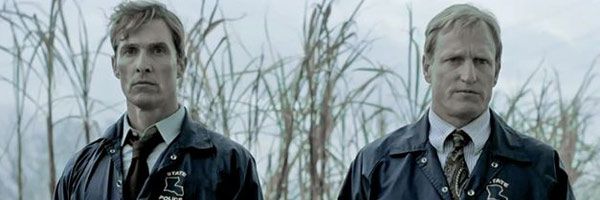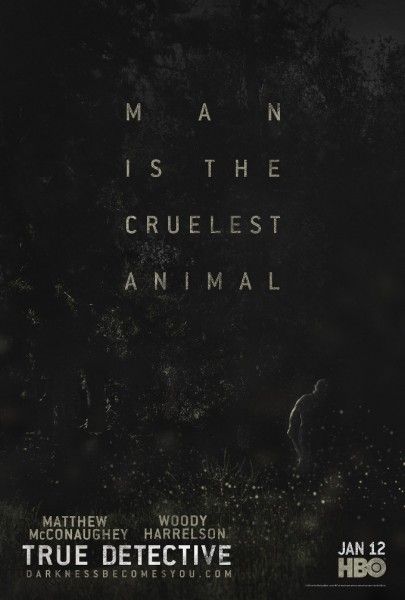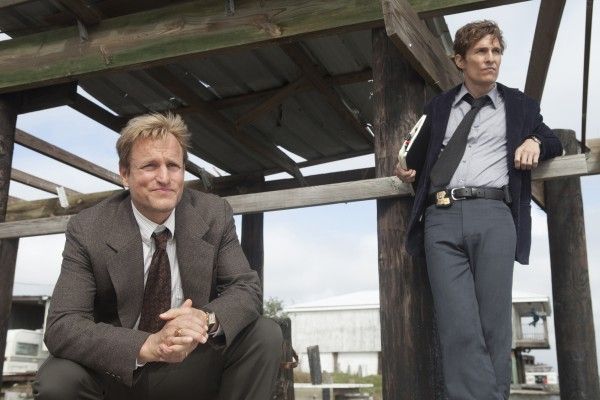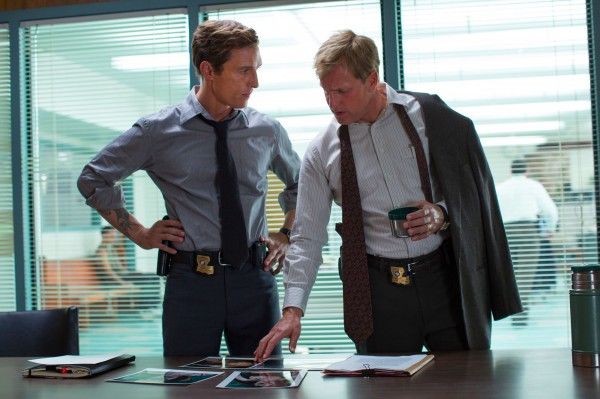True Detective's finale should have proven, without a doubt, the narrative benefits of a limited series. "Form and Void," like almost everything about the series, illustrated a singularity of vision that has come to define True Detective. It was also possibly the most novelistic of any of the series' individual episodes. "Form and Void" was the conclusion of a story whose design and intent were always known, and the tale that the series managed to spin in those mere eight episodes, with such weight, such darkness, yet such strange beauty, was spellbinding. Hit the jump if you want to make flowers ….
"Form and Void" brought together both sides of what has made True Detective so engaging. The emotional and relationship aspects still outshone the murder mystery, but it was given its own creepy, fitting due. Errol remained the crux of The Yellow King story (making the mystery as sick but straight-forward as many predicted), and it was up to Marty (of all people) to make the connection that put their detective work on warp speed to find him. From there, the satisfaction of the whirlwind procedural that brought them to that nightmare house of death was augmented by familiar moments like Rust and Marty back in the car, the former waxing philosophical while the latter sat in confusion.
These "true detectives" were all of that in "Form and Void," going as far -- as many suspected -- as to put their own lives in jeopardy to bring down the killer. There are probably arguments to be made against the theatricality of the scene of Rust and Marty's stabbings at the hands of Errol, but in my personal, probably romanticized perspective, I felt it was a moment that was necessary to bind them together in their war against darkness.
Other battles were put to rest. The conversation the two had about Maggie, and the emotions there, was a natural way to both open and close that chapter for them (and interesting that Maggie did take Rust off the hook for it, to some degree). Rust telling Marty it was his fault for pushing a good woman to the place where she would have to do something like that in the first place maintained the honesty of their friendship. Though last week was the real turning point when Rust realized he needed Marty for police records, "Form and Void" is where he also relied on him as a detective, and ultimately as a friend. It was earned.
Errol's story, and the legacy of The Yellow King, were essentially summed up and dismissed as a lot of inbreeding on the one hand, and a group of voodoo-worshipping pedophiles on the other. Lord love you Louisiana, but it's not all that surprising in the end. The story didn't really earn more exploration than that. The "why" has very little meaning here -- Errol was dead, some of the men in the video were found, but not all. That's the reality, and as Marty points out, the darkness has always had the upper hand. They closed this case, so far as they could. The King was dead. What that meant for the detectives personally was, as always, what mattered the most.
Though there's still the possibility that Rust and Marty might team up to find and take down those other men, or take on other cases together (maybe just wishful thinking, but still), the reality we know is that both men faced the end in a way only this case could make them. They both literally faced death, yes. But when Marty's family came to see him and he said he was fine, and then broke down, there was a definite sense (especially with the close-up of that new rock of a wedding ring for Maggie) of his realization there was nothing else for him. No family, no more case. His attachment to Rust then made sense that it was stronger than ever before, and that it took on a new dimension. Marty wanted to take care of him, because Rust drew him into this -- the case that defined a ruin part of his life -- and what was next otherwise?
For Rust, the case made him born again as a human being. No longer staring out into the "meaningless ghetto" of existence, and time's damning flat circle, he reached into a warm depth that comforted him with a beyond that he had locked away any access to. The emotions he felt towards his daughter and his father in those moments reawakened him. Even though he woke up literally when he wished he hadn't, he acknowledged the feeling was not gone, but stronger than ever. Somewhere, the release of this case released everything for him, and he was able to regaining actual feeling.
"Form and Void" had a montage towards its close that took us back, in reverse order, to the turning point scenes in the series, and in the case. From Errol's house to Reggie LeDoux's own filthy horror palace, to the swamps, backwoods and bayous that produced such a strong sense of place, with such wonderfully and frightfully painted characters. Ultimately it led us back to the tree where it all began. There was a real feeling of accomplishment in this, and a reminder, back at that tree, of what happened, and over how much time, and of the twisted road it took to get there. True Detective was truly good. It may just be "one story. Light versus dark." But within that, it was also so much more.
Episode Rating: A+
Season Rating: A+
Musings and Miscellanea:
-- Does a house full of filth and dolls ever portend anything but horror?
-- Errol's psychology doesn't really matter, the man was possessed by evil, but it seems like the suggestion was that his father abused him, and that put him on the path to creating such horror, sacrificing children for his own childhood? Keeping your parent sewn up, bound and rotting in a shed is a good indication something was not right there … Still, the glimpses of Errol's life with his demented half-sister was enough to satisfy most, I think, into the realization that he was just batshit. Other shows might have spent the entire episode investigating the filth of their nightmarish Grey Gardens and the fort just beyond it, but this was never True Detective's motivation. But for the love of Odin, it was gross.
-- What was up with Errol's multiple accents?
-- "You want to make flowers?" NOPE.
-- Bringing the bar owner back into things as their "sniper" continued to keep the show so tight on the point of all the characters mattering.
-- All of the images in that horror palace Errol had made for himself … the drawings, the children's shoes tied up, the nest he had created, the throne of skulls, the mummies …
-- I was glad Marty brought up Rust's visions, even though that seemed only to set up that vision while in the fort (because he hadn't one in awhile, so far as we had seen). "What happens in my head is not something that gets better."
-- Sheriff Steve's reaction to the video was appropriate.
-- I don't think anyone guessed the green on the drawing was green paint, did they?
-- I guess we'll never know why Audrey was so messed up. Maybe, as some suggested, she was just picking up on the vibes.
-- Not surprising that the Tuttle family severed any connection they could to the Childresses. Again, very true to life. The powerful escape.
-- It was typically savvy of Rust and Marty to create contingency plans in case they didn't come back from their hunt, both with the police force and with the media. Maybe it showed their allegiances -- Rust to truth, and Marty to justice.
-- "I could feel my definitions fading in the darkness […] I disappeared. But I can still feel her love there. Even more than before" - Rust.
-- How great were Rust and Marty's interactions at the hospitals? Rust is barely out of a coma, and they're trading "fuck yous!" and flicking each other off. "Don't ever change, man."
-- "L'chaim, fatass" - Rust.
-- "Appears to me that the dark has a lot more territory" - Marty.
-- "You know, you're looking at it wrong, the sky thing. Well, once there was only dark. You ask me, the light's winning." - Rust.




